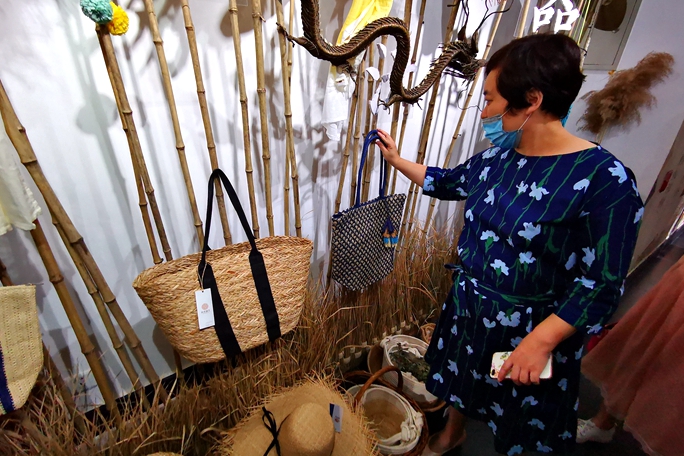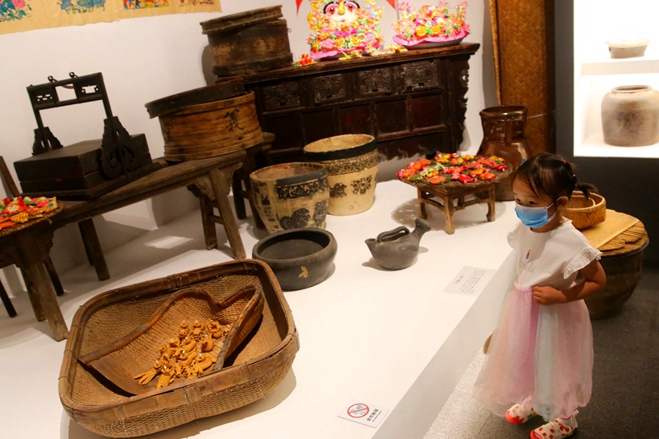VOCATIONAL SCHOOL HELPS SHAPE DESTINIES
Shandong institution makes its mark with quasi-military approach
Since its founding in 1984, Shandong Lanxiang Senior Technical School has had its fair share of controversy.
An international media report in 2010 - the authenticity of which was denied by the school - said the institution was at the heart of a secretive global hacking conspiracy, thus giving it an air of mystique.
In 2014, reports alleged that the school's president had pressured students to assault his father-in-law in Henan province amid a financial dispute with his ex-wife, with whom he fathered six children.

It made headlines again in June, when 77 People's Liberation Army Air Force soldiers graduated from the institution after just three months, during which time they reportedly learned how to operate backhoes.
Many consider the school in Jinan, Shandong province, to even be as well known as one of the country's top academic institutions, Peking University, although the two share few commonalities.
Many also grew up hearing a TV advertisement for the school saying: "Which is the best school for learning technical skills? Come to Lanxiang in Shandong."
Scores of students who have graduated from the school have moved to developed countries for work thanks to skills learned.
However, despite being in the media spotlight, one simple fact has been ignored. Lanxiang is just one of a countless number of vocational schools at which millions of students from rural areas gain skills that help change their destinies. What does help it stand out is its martinetlike student training practices and special incentives for staff members.
Fewer students from rural areas are admitted to competitive high schools compared with their urban counterparts, and the former also have a lower probability of success on college entrance exams, or gaokao, where competition is fierce. The exam has long been described as a "stampede of tens of thousands of soldiers and tens of thousands of horses crossing a single log bridge".
It is regular practice for students' tuition fees to be paid before they start their school studies. However, at Lanxiang this is not the case. The annual tuition fee of 11,000 yuan ($1,600) does not have to be paid immediately, only after a one-month trial study period.
"Most students come to us at about the age of 15. Many have no idea at all about the majors they are going to study. They could change to a major that really interests them during the one-month trial," said Jiang Yan, the school's head of reception, adding that this could help save parents from wasting money.
She also said the school will expel students for bad behavior or who are difficult to manage during the trial period.
Once students start at the school, they lead a semi-military life. For example, they have to fold up their blankets and make them box-shaped, just as Chinese soldiers do. Their phones have to be turned off and put in certain place in their classrooms during lessons.
Meanwhile, the closed circuit TV monitoring system at the school covers almost every area.
Students have to stay on campus most of the time, only being allowed out on Sundays. Even then, they have to return before 6 pm. After lessons, students from each class will go to the canteen together in four orderly rows.
Each class has about 60 students, and the total number is more than 20,000. A single class is a highly autonomous body "governed" by a head teacher who is "contracted" and empowered to dispose of 70 percent of students' tuition fees. He pays his teachers money from the 70 percent.
Money will be deducted to pay off losses for the school if students quit, and to cover medical expenses for those who are injured. That which remains covers the "contractors'" income.
"I choose teachers for my class and can fire them if they don't perform well," said Li Jinling, one of the head teachers, adding that head counts are a must for every class, with 2 yuan (30 US cents) deducted from a teacher's wage of about 30 yuan an hour for every student who is absent.
Lanxiang has a simple philosophy - students will not miss class or leave the school if they are provided with knowledge and skills in a favorable environment.
Li said managing a group of students, most of whom are not academically qualified to enter senior high schools, is not easy, especially at the start.
When students fall ill, Li buys them medicine. When they fail to receive money for expenses from their parents, he lends them cash, and he makes a phone call to students' parents at least once a week.
Li was under so much pressure in the first few months after he "contracted" his class that his weight fell by about 5 kilograms. The 44-year-old even took a notebook with him to jot down students' personal details. "You have to know students well first before knowing how to manage them," he said.
Head teachers' working day begins at 7:30 am when they join a daily school meeting. Their work ends only at about 11 pm after visits to dormitories to ensure no students are missing. All head teachers live on campus and are offered free accommodation that can be shared by family members.
"This system has resulted in a win-win situation for teachers and students," Li said. As his monthly salary has doubled to more than 14,000 yuan, almost three times that of teachers at public vocational schools, students are guaranteed a good study environment and high-quality classes.
The school has 4,000 engines to be dismantled and reassembled by students majoring in vehicle repairs. It also has a class titled "image design" for all students, in which they can only receive a pass if they have their hair cut every two weeks by those majoring in hairdressing.
Lanxiang has a bidding system to help students find jobs with the best salaries. Three months before they graduate, students' details are posted on the school's website. Companies have to pay 2,000 yuan for each graduate they plan to recruit before they take part in the bidding, said Xu Ruiqing, who works for Lanxiang's careers center.
The initial bidding price is set at between 2,500 and 30,000 yuan. Companies need to add at least 100 yuan each time they bid, Xu said.
Summer in Jinan, where the school is located, is a test for many. Few people venture outdoors during the hottest part of the day, as they become covered in sweat after just a few minutes' walking.
However, the bustling scenes at the Lanxiang reception center stand in stark contrast to the soporific atmosphere outside.
Qu Bin, head of enrollment for the school, said: "On a normal day, we see at least 200 visitors, including candidate students and their parents who come to consult us. We never lack students."
With the new school term starting early next month, many students are preparing to start a new life at senior high schools or universities.
This is also a time when many parents of students who failed their senior high school and college entrance examinations wonder about what they can do to change their children's destinies.
Against this backdrop, it is easy to understand why Lanxiang is in hot demand.
Different from Peking University, which has students mainly from urban areas, 85 percent of students at Lanxiang are from rural areas.
The simple but explicit school advertisement appears to have been aimed at the rural population, most of whom have little education - and it is working.
Asked why they chose Lanxiang, almost all students and parents gave the same answer: the ad.
Yang Lianying and her son took a bus for almost three hours from Qiuxian county in Hebei province to the school.
"The advertisement is quite impressive. I think Lanxiang is a big school with great strength," the 46-year-old said.
She plans to send both of her twin sons to the school, although the one that was born first accompanied her this time.
Rong Lanxiang, the school's president, is proud of the ad's message, which he drafted, and which has remained almost unchanged since the school was established in 1984. "Regarding the advertisement, I am an expert," the 54-year-old said.
The school now spends dozens of millions of yuan on advertising.
Lanxiang also differs from Peking University in another respect - the latter never advertises.
Contact the writer at [email protected]
|
|
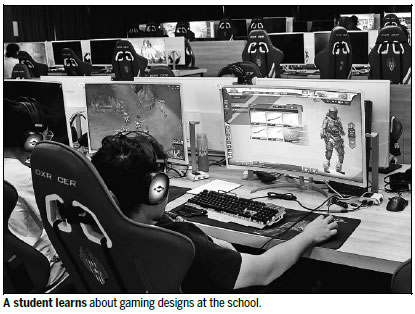
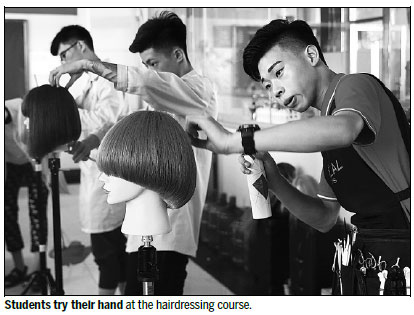
|
Rong Lanxiang (center), president of Shandong Lanxiang Senior Technical School, with his students.Photos By Zou Hong / China Daily |
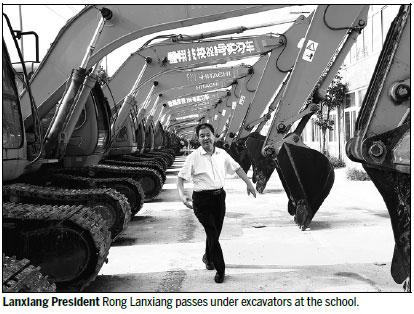
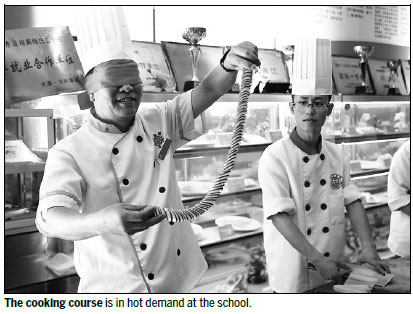
(China Daily 08/27/2018 page1)

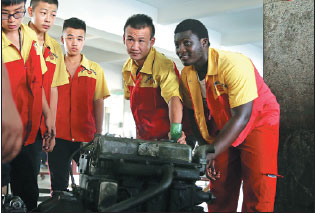
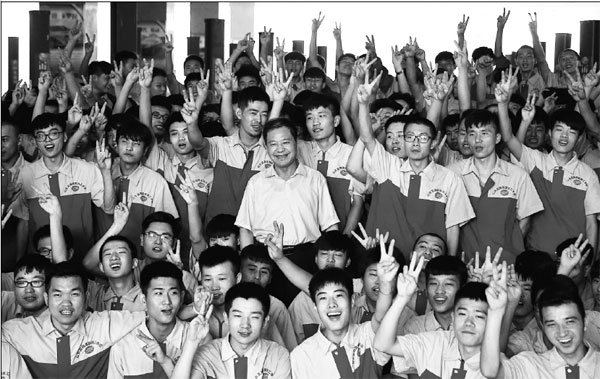
 Shandong Culture and Tourism Consumption Season
Shandong Culture and Tourism Consumption Season Culture, tourism sectors pick up in Shandong as epidemic wanes
Culture, tourism sectors pick up in Shandong as epidemic wanes